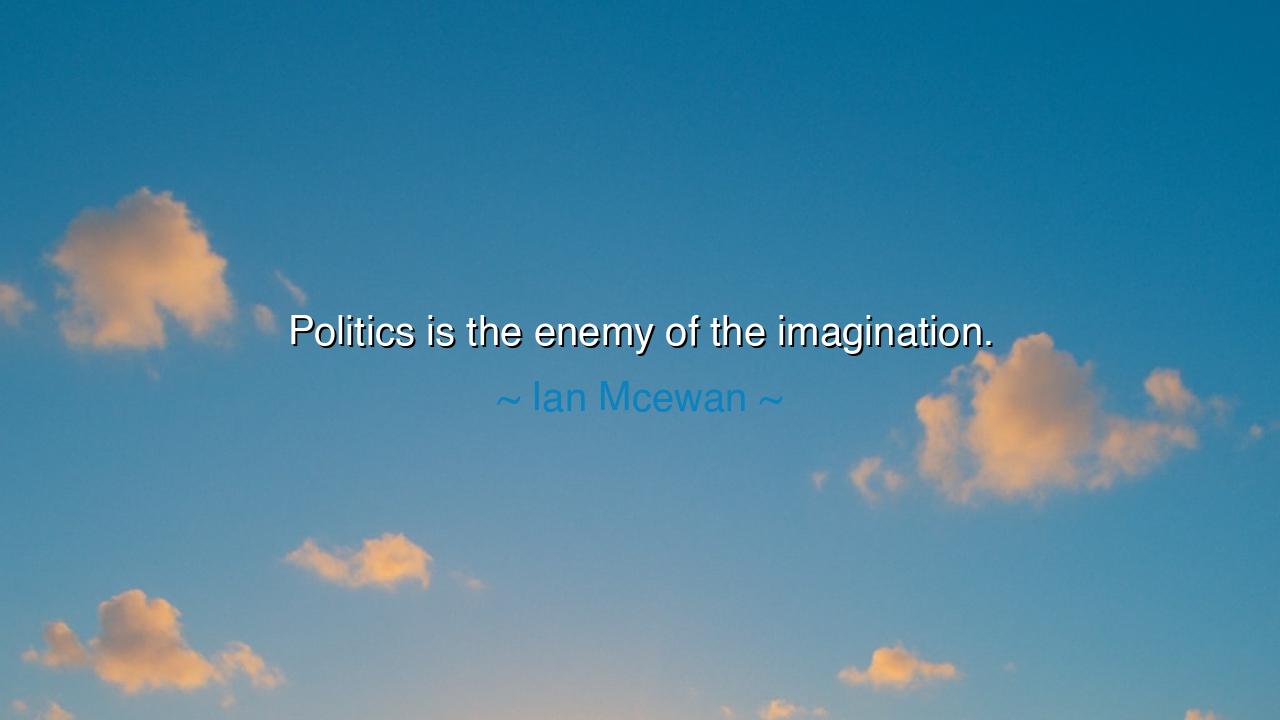
Politics is the enemy of the imagination.






“Politics is the enemy of the imagination.” Thus declared Ian McEwan, the novelist whose words often pierce through the veils of illusion to reveal the deeper truths of the human spirit. In this statement, McEwan gives voice to an eternal tension — the struggle between imagination, which seeks freedom, and politics, which demands alignment. For imagination is the realm of boundless creation, of empathy, and of possibility; while politics, by its nature, constrains, divides, and demands loyalty to tribe and ideology. To say that politics is the enemy of the imagination is to mourn how the vast sky of human thought is too often caged by the narrow walls of partisanship.
The origin of this quote lies in McEwan’s reflections on the creative process and the moral duties of the artist. He spoke these words not as a rejection of civic duty, but as a warning against allowing political ideology to dominate the inner life. The artist, he believed, must stand apart from dogma — whether of the left, the right, or the center — for imagination cannot flourish where thought is bound by allegiance. The creative mind must roam freely through all experiences, seeking understanding rather than victory. Once imagination is shackled to a cause, it becomes propaganda; once it serves power rather than truth, it ceases to be creation and becomes manipulation.
In every age, this battle has been fought. The tyrants of history have always feared the imagination, for it is the one thing they cannot control. When Galileo turned his telescope to the heavens and declared that the Earth moved, it was not mere science — it was an act of imagination. He envisioned a universe beyond what authority permitted. And for that vision, he was silenced. So too, in the 20th century, totalitarian regimes sought to bind the imagination of poets, painters, and dreamers, forcing them to serve the state’s narrative. In Stalin’s Russia, writers like Osip Mandelstam and Anna Akhmatova were persecuted because their art dared to be free. Politics, when unchecked, devours imagination — for it cannot abide a truth it cannot command.
Yet McEwan’s warning extends beyond the halls of power. Even in free societies, politics can become a quiet poison that dulls creativity. When we define ourselves only by our affiliations, we cease to see the full spectrum of human experience. Imagination thrives on complexity and contradiction; politics feeds on simplicity and certainty. The artist, the thinker, the compassionate human — all must dwell in uncertainty, in wonder, in doubt. To imagine is to empathize with the other, even the enemy. But politics, by its nature, divides the world into “us” and “them,” leaving no space for the empathy that nourishes creation.
Consider the story of George Orwell, who began his life as a political idealist, fighting in the Spanish Civil War for justice and equality. Yet it was in witnessing the corruption of both sides — the cruelty of fascism and the hypocrisy of totalitarian socialism — that his greatest works were born. Out of disillusionment came the novels 1984 and Animal Farm, where his imagination transcended party lines to reveal universal truths about power and control. Orwell’s genius lay not in choosing sides, but in seeing beyond them. He proved that imagination, when freed from political chains, can expose what politics seeks to hide.
There is a paradox in McEwan’s words. Though imagination and politics are enemies, they are also intertwined. The dreamer may reject politics, but every dream of a better world inevitably brushes against it. The task, then, is not to abandon politics entirely, but to ensure that imagination leads, and politics follows. The moment politics leads, the spirit dies. A society guided by imagination builds cathedrals of justice and compassion; a society ruled by politics builds walls and slogans. The balance must be guarded as one guards a sacred flame.
So take this lesson to heart, O seeker of wisdom: Do not let your imagination become the servant of ideology. Seek truth, not validation. Listen to stories that challenge your beliefs as much as those that comfort them. Read widely, think freely, and never allow your creative spirit to be drafted into the armies of division. For the imagination is the breath of the soul — it is what makes us human, what allows us to envision peace amid war, and beauty amid despair.
Thus, McEwan’s words stand not merely as a warning, but as a call to courage. When the world demands that you choose sides, choose instead to imagine. When politics divides, let imagination unite. For it is not through policy or power that humanity will be redeemed, but through the creative fire that dares to see beyond them — through the imagination, that eternal force which no empire, no ideology, and no tyranny can ever truly destroy.






AAdministratorAdministrator
Welcome, honored guests. Please leave a comment, we will respond soon